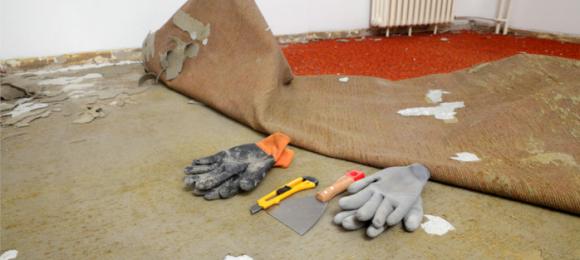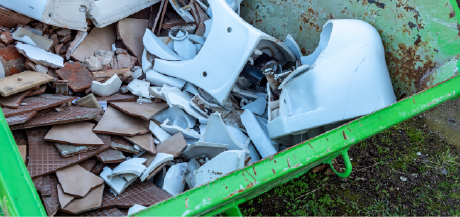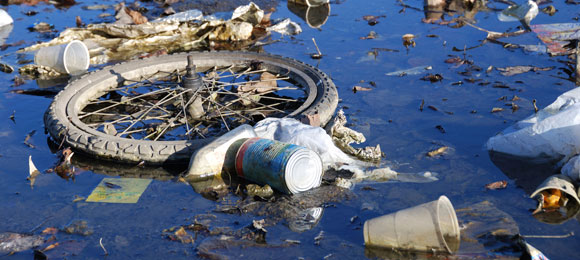
Updated September 13, 2023
According to Let’s Do It!, a global organization responsible for World Cleanup Day and working to help to clean up illegal dump sites, there is approximately 100 million tons of illegal garbage lying around the world.
It’s a problem that affects all parts of the United States, particularly big cities and rural areas.
Illegal dumping affects the environment, public health, and increases everyone's taxes.
Although the problem may be caused by relatively few people, it affects everyone.
Luckily, cities across the country have stepped up enforcement and have raised awareness about the problem in recent years.
Today, technology makes it easier than ever to report illegal dumping sites to local authorities, and stiffer penalties have people thinking twice before tossing an old mattress or scrap tires on the side of the road.
This article describes a quick overview of the problem, the many consequences involved, and solutions to the issue.
Jump to:
Find a dumpster rental in my area
It Can Be a Felony Offense
Depending on your local and state regulations, illegal dumping is a misdemeanor or felony punishable by jail time in some cases.
Fines start at $50 for minor offenses and can reach up to thousands of dollars in some situations.
Some states are really cracking down on the problem and doling out tougher penalties to offenders.
New Jersey, for instance, implemented a new plan in 2014 that will punish illegal dumpers with up to $50,000 fines, forfeiture of vehicles involved in the dumping, and possible jail time.
New Jersey’s “Don’t Waste Our Open Space” campaign consists of a statewide crackdown of illegal dumping, involving the use of hidden cameras strategically positioned at common dump sites and public involvement to ID offenders when necessary.
Many people wonder, "Is there a difference between littering and illegal dumping?"
In most states, yes.
Litter is generally defined as a small quantity of waste disposed of illegally (e.g., throwing a candy wrapper out a car window).
Illegal dumping is generally recognized as disposing of a larger volume or weight of waste/debris (e.g., dumping furniture, tires, mattresses, or construction debris).
Littering is considered a minor offense in most cases, but illegal dumping can lead to felony charges, hefty fines, and jail time.
In Georgia, for instance, litter is defined as being less than 10 lbs or under 15 cubic feet in volume, while it defines waste as being more than 10 lbs or greater than 15 cubic feet in volume.
Littering carries fines of at least $100, while illegally dumping large quantities of waste can carry fines of up to $25,000 and/or two years of prison for a second offense in Georgia.
Learn more:
- Solutions to Stop Others from Illegally Dumping Trash in Your Dumpster
- How to Get Rid of Bulky Waste Items
- The Best Ways to Get Rid of Furniture, Appliances, and More
Health Risks
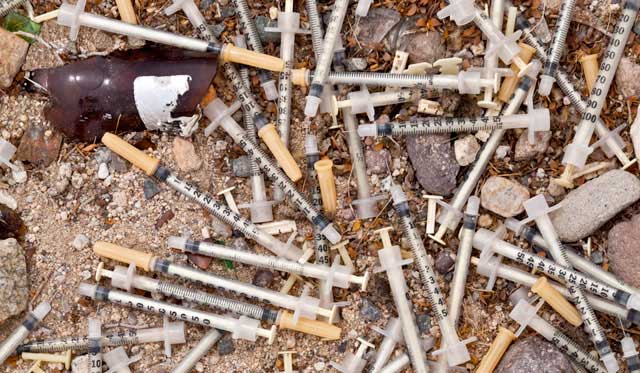
Immediate health risks posed by illegal dump sites include physical and chemical injury to people, especially children, coming into contact with dangerous debris like rusty nails, chemicals, or sharp metals.
Other adverse health risks come into play when dangerous chemicals, like automobile fluids, household cleaners, industrial wastes, appliances containing chemicals (e.g. refrigerators), and tires, are illegally disposed of.
The chemicals leach into the soil and area waterways. This is the same soil we use to grow crops and the same water we drink.
A third negative consequence common to illegal dumping sites is the ideal conditions these places make for rodents, vermin, and mosquitoes.
Disease-carrying rodents love to call these places home, and this poses a major health hazard to anyone living nearby.
Likewise, mosquitoes thrive inside the moist, warm conditions offered by disposed of tires.
In fact, an EPA report states mosquitoes “multiply 100 times faster than normal in the warm, stagnant water standing in scrap tire casings.”
The Cost of Illegal Dumping
“Out of sight, out of mind” is often the mindset of people who dump wastes illegally, but that’s far from reality.
Cleaning up, monitoring, and enforcing instances of illegal dumping cost taxpayers a significant amount of money each year.
The EPA mentions that some urban areas in the U.S. spend “several million dollars per year on cleanup, hauling, and disposal” of illegally dumped wastes.
It’s a problem in every state. For example, in Pennsylvania, it costs taxpayers about $10.1 million per year to clean up roadside litter and $835 per ton to clean up an illegal dump site, according to the Pennsylvania Department of Transportation.
Illegal dumping also drives down property values due to safety concerns and aesthetic reasons. Additionally, it negatively affects residential and commercial development, so local economies suffer as well.
Whether you realize it or not, “midnight dumping” as it’s sometimes called affects you financially, even when you’re not the offender.
Environmental Issues
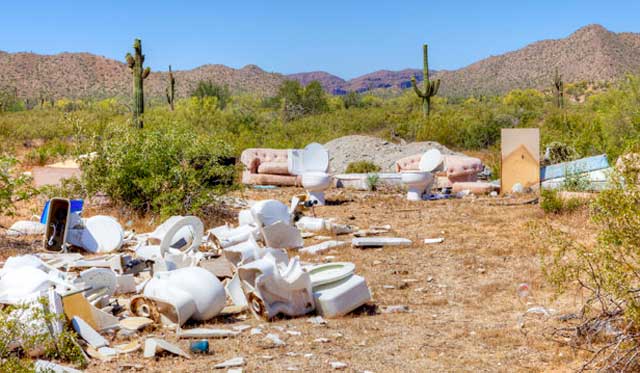
Aside from being an eyesore, illegal dumping wreaks havoc on the environment.
As previously mentioned, chemicals from wastes and certain appliances can leach into soil and local waterways causing damage to plants, wildlife, and water quality.
According to Project Green Sweep of the Ohio EPA, old appliances can release chlorofluorocarbon (CFC) into the air, which is damaging to the earth’s ozone layer.
Other issues include increased risk of flooding and forest fires.
Wastes dumped in waterways can block the natural flow of water and lead to flooding issues over time.
Illegal dumps are also notoriously susceptible to fire caused spontaneously or by arson.
Fire destroys area forests and homes, causing both an environmental and financial disaster.
What Can I Do About the Problem?
If you have a smartphone, it’s easy to help. An app like TrashOut makes it easy to report illegal dump sites.
You simply fire up the app, take a picture of the illegally dumped waste, let your phone’s GPS grab the location, and submit it.
TrashOut reports it to the local authorities and will even keep you in the loop as to what actions are taken to clean up the area.
Some cities have dedicated departments to handle unauthorized dumping of wastes.
Check by going to your local government website or by calling the environmental division of your local government.
If your city uses the 3-1-1 hotline program, it can often be used to report dump sites. See a list of cities that utilize the 3-1-1 non-emergency municipal service line.
Some cities offer rewards for information leading to the conviction of illegal dumpers.
According to CalRecycle, the city of Sacramento and Shasta County offer $250 rewards, and San Bernardino County offers rewards of up to $1,000 for tips leading to a conviction.
Continue reading:
- Recycle Demolition and Remodeling Debris to Save Money and Protect the Environment
- How Garbage Is Safely Contained in Landfills
- Recycle Your Electronics With Junk Removal Services
The Proper Way to Dispose of Bulk Amounts of Waste and Debris
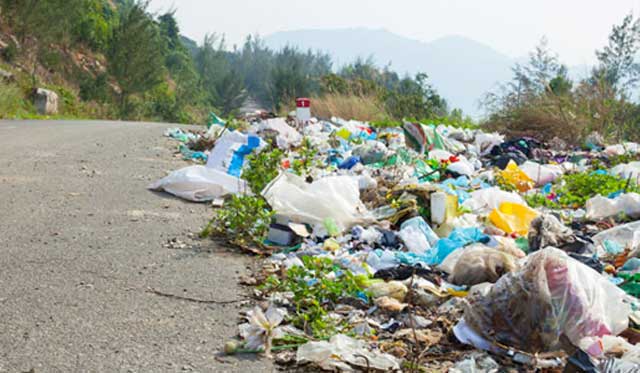
The correct ways to dispose of bulky items and large volumes of waste/debris are to:
- Contact your local trash hauler to inquire about bulk waste pick-ups. This service is typically limited in the amount/type of junk or debris that’s allowed and there’s an additional fee for this service.
- Rent a dumpster. This is one of the most economical ways to dispose of large amounts of household junk, appliances, construction and demolition (C&D) debris, yard wastes, and more.
- Hire a junk removal company to come and haul away your junk and debris for your. This option is the most convenient and requires the least amount of work.
- Haul to the landfill, licensed transfer station, or recycling facility yourself. You'll have to make sure that you have a proper vehicle to do this and must be prepared to wait to in line at the landfill. Considering time and money spent to get there are back, this is the least preferred method of bulk waste disposal.
- Dispose of household hazardous wastes (HHW) by dropping off at the nearest HHW processing facility, or by checking your local government website for information about when/where the next HHW collection event is being held. Most medium-to-large cities in the U.S. offer one or both of these options. If your city does not, contact your local waste hauler, landfill or a dumpster rental company for more information.
It’s becoming increasingly important to make sure waste is put in the proper place. If you're in need of a dumpster rental or junk removal crew, Hometown can help connect you with locally-owned companies in your area. Our single quote request forms makes it easy to send your project needs to different services in near you so that you can choose the best company based on pricing, customer service, and availability.
